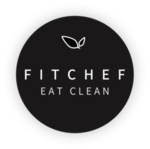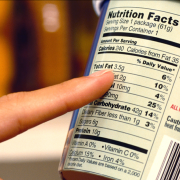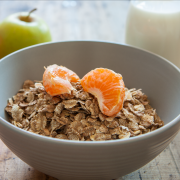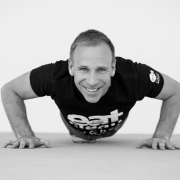
When it comes to getting ready for a training session, it’s not just about having the best gear like the right training sneakers or an expensive heart rate monitor. Fueling up on the right foods, both before and after your workout, is an equally important part of the puzzle for any good training program. In the quest to gain muscle, there is no shortage of advice and claims on how to gain muscle. Here is the lowdown on the nutrition science behind building muscle.
Protein is Power
Protein is the food group most often talked about when it comes to muscle building. Protein has many roles such as forming of enzymes and hormones, defending the body against illness and disease through the immune system, and, of course, providing the building blocks for muscle growth and tissue repair.
When digested, protein breaks down into its building blocks called amino acids. There are 20 amino acids important for our health. Of these, 9 of the amino acids are essential because they cannot be made by the body and must be eaten through the diet.
These include the branch chain amino acids (BCAAs) valine, leucine and isoleucine, as well as histidine, lysine, methionine, phenylalanine, threonine, and tryptophan. The best sources of essential amino acids are animal proteins like meat, eggs and chicken.
The remaining 11 amino acids are called nonessential amino acids as they can be made by the body. In certain cases, these amino acids may become conditionally essential in certain times like disease, illness or stress. These include arginine, cysteine, glutamine, glycine, proline, serine, and tyrosine. Alanine, asparagine, aspartic acid, glutamic acid and selenocysteine make up the remaining non-essential amino acids.
How much protein do you need each day?
Protein is well-known in exercise circles for muscle building and repair so many athletes place great attention on their protein intakes. In combination with resistance (weight) training, protein provides the building blocks for muscle building, as well as support repair of damaged muscle that results from training. Protein is also needed to keep the immune system strong, which often takes a knock with hard training.
The average person needs 0.8 g of protein per kg body weight daily, about 56 g for a person weighing 70 kg (about 186g of meat per day). Though this amount of protein may be appropriate for most, it is not enough to meet the higher needs for muscle gain and the International Society for Sports Nutrition (ISSN) recommends double this: 1.4 – 2.0 g of protein per kg (i.e. 98 – 140 g of protein for the 70 kg person, about 324 – 466g of cooked beef or chicken. Remember that eating 300g of steak is not the same as eating 300g of protein. A good rule of thumb that cooked beef or chicken gives you around 30% of protein. Using this example, it would be about three FitChef meals. For more personalised guidance on how your body responds to exercise and protein, try the MUHDO DNA test from The Wellness Revolution.
To meet these protein needs, supplements including protein bars, vegan-friendly soy protein or pea protein shakes, and protein shakes made from whey (whey protein concentrate, whey protein hydrolysate, whey protein isolate) and casein, the two key types of protein found in milk, are popular. While protein supplements may be a convenient way to consume additional protein, protein from supplements is by no means superior to protein from food. A “food first” approach should include foods that are naturally protein-packed such as milk, yoghurt, eggs, lean meat, skinless chicken, and white and fatty fish. For vegetarians and vegans, legumes such as beans, chickpeas, lentils, and soya beans and soya products are also a source of protein. FitChef is a real food company and we always suggest real, whole food sources of protein first before looking at supplements. In fact, the good ol’ chicken breast can be cheaper and just as effective for muscle building compared to concentrated whey protein.
|
|
Protein Daily Target |
||||
|
Food |
Protein % |
70g* |
90g* |
120g* |
140g* |
|
Oats - Cooked |
2.5% |
2800g |
3600g |
4800g |
5600g |
|
Spinach - Cooked |
3.0% |
2333g |
3000g |
4000g |
4667g |
|
Quinoa - Cooked |
4.4% |
1591g |
2045g |
2727g |
3182g |
|
Edamame (Soy beans) - Raw |
10.9% |
642g |
826g |
1101g |
1284g |
|
Egg - Cooked whole |
12.6% |
556g |
714g |
952g |
1111g |
|
Lentils - Cooked** |
17.9% |
391g |
503g |
670g |
782g |
|
Chicken Breast - Cooked |
31.0% |
226g |
290g |
387g |
452g |
*g per day to achieve protein intake; ** lower quality protein (lower in essential amino acids)
A 70kg adults requires 1-2g protein/kg = 70-140g protein/day. 1.4-2g/kg is required to build muscle (with exercise)
Do carbs play a role in muscle building?
Carbohydrates are the body’s primary source of energy. The body stores dietary carbohydrate in a form called glycogen, found mostly in our muscles but also in the liver. This helps our bodies have enough energy stores to last around 90 minutes of exercise. The body can convert carbohydrates (when needed) into fat and protein for energy but this is a far less efficient process than simply using carbohydrates for energy.
But did you know that only 5 % of dietary protein is used for energy when active? This makes carbohydrates the fuel of choice during a workout. In fact, when too little carbohydrate is eaten in the diet, the body’s muscle protein could end up being used for energy with the unwanted breakdown of muscle. This is why it is important to eat enough carbohydrates in the diet to allow for protein to be used for muscle building and not to meet energy requirements. Focus on excellent quality carbohydrates (e.g. oats, starchy vegetables like baby potatoes, sweet potatoes and corn, health/seed or 100% rye bread, brown rice, quinoa, or legumes like beans, chickpeas and lentils) at the expense of sugary, inferior quality carbs (e.g. sugar, sugar containing drinks and foods, white rice, white wraps, processed cereals).
What about after training?
Most people only focus on protein after training. For this reason, according to the Journal of the International Society of Sports Medicine, consuming protein along with some carbohydrate is the best choice for optimal recovery so the protein will help build and repair muscle damaged during training and the carbohydrate tops up depleted glycogen stores so you’re ready for the next training session. Eating protein soon after training can also help to prolong the protein building response to exercise, enhancing muscle gains and minimising muscle breakdown. Spikes in muscle building happen when we consume 20 – 25g of protein at a time. This is the same amount of protein we find in three eggs, one medium chicken breast (120g), 100g of beef, or one serving of protein shake. Interestingly more than this amount offers no further benefit to muscle gain and consuming excessive amounts of protein is simply wasted as it is excreted as amino acids in the urine or even stored as extra energy in the form of fat. For this reason, spread protein throughout the day in meals and snacks, rather than having the same amount of protein over just one or two main meals. For example, have eggs or baked beans on wholewheat toast for breakfast, include yoghurt or biltong between meals as a snack, and have lean meat or a grilled chicken breast with roasted vegetables and sweet potatoes at dinner. This will produce multiple spikes in muscle building over the course of the day.
In summary, to gain muscle, you need to eat an adequate amount of energy (kilojoules/calories) in the form of whole foods that include lean protein and high-quality carbohydrates. Only after your nutrition and exercise regimens are in check should you start considering supplements.
References
1. Arragon AA R et al. International Society of Sports Nutrition position stand: diets and body composition. Journal of the International Society of Sports Nutrition (2017) 14:16. DOI 10.1186/s12970-017-0174-y.
2. Burke, L, and Deakin, D. Clinical Sports Nutrition. 4th edition. 2010. McGraw-Hill, Australia.
3. Jager R et al. International Society of Sports Nutrition Position Stand: protein and exercise. Journal of the International Society of Sports Nutrition (2017) 14:20. DOI 10.1186/s12970-017-0177-8.
4. Joint Position by the American College of Sports Medicine, Academy of Nutrition and Dietetics, Dietitians of Canada. Nutrition and Athletic Performance. (2016). Medicine and Science in Sports and Exercise. pp. 543-568.
5. Krader RB et al. International Society of Sports Nutrition position stand: safety and efficacy of creatine supplementation in exercise, sport, and medicine. Journal of the International Society of Sports Nutrition (2017) 14:18. DOI 10.1186/s12970-017-0173-z.
6. Potgieter., S. Sport nutrition: A review of the latest guidelines for exercise and sport nutrition from the American College of Sport Nutrition, the International Olympic Committee and the International Society for Sports Nutrition. (2013). South African Journal of Clinical Nutrition, 26(1), pp. 6-13.
7. Stearn, RL., Emmanuel HE., Volek, JD, and Casa, DJ. (2010) Effects of ingesting protein in combination with carbohydrate during exercise on endurance performance: a systematic review with meta-analysis. Journal of Strength and Conditioning, 24(8), pp. 2192-2202.
8. Williams, MH., Anderson, DE, Rawson, ES. Nutrition for health, fitness and sport. 10th edition. McGraw-Hill, Australia. 2013.

 No added or artificial sugars
No added or artificial sugars The cleanest ingredient labels
The cleanest ingredient labels






